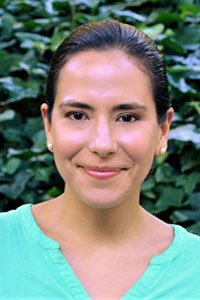Date/Time
Date(s) - 04/19/2021
9:35 am - 10:30 am
Categories
Markita Landry, Ph.D.
Assistant Professor
Chemical and Biomolecular Engineering
University of California-Berkeley
Title: Nanomaterials Engineering to Probe and Control Living Systems
Abstract: Unique physical, chemical, and optical phenomena arise when materials are confined to the nano-scale. We are accustomed to making observations and predictions for the behavior of living systems on a macroscopic scale that is intuitive for the time and size scales of our day-to-day lives. However, the building blocks of life: proteins, nucleic acids, and cells, occupy different spatiotemporal scales. Our lab focuses on understanding and exploiting tunable optical and mechanical properties of nanomaterials to access information about biological systems stored at the nano-scale. In the context of leveraging nanomaterial optical properties, we present recent work on developing and implementing neuromodulator nanosensors to image serotonin [1] or dopamine [2] volume transmission in the extracellular space of the brain. We validate our dopamine nanosensor in acute striatal slices with electrical and optogenetic stimulation of dopamine release, and show disrupted dopamine release or reuptake kinetics when brain tissue is exposed to dopamine agonist or antagonist drugs [2,3]. In the context of leveraging nanomaterial chemical properties, we also discuss how high aspect ratio nanomaterials can be synthesized to carry biomolecular cargo to living systems. In particular, genetic engineering of plants is at the core of environmental sustainability efforts, but the physical barrier presented by the cell wall has limited the ease and throughput with which exogenous biomolecules can be delivered to plants. We will describe how nanomaterials engineering principles can be leveraged to genetically manipulate living plants [4,5], without transgene integration [6], in efforts to reconcile the benefits of crop genetic engineering with the demand for non-GMO foods [7]. Our work in the agricultural space provides a promising tool for species-independent, targeted, and passive delivery of genetic material, without transgene integration, into plant cells for rapid and parallelizable testing of plant genotype-phenotype relationships.
1. Jeong, S.*, Yang, D., Beyene, A.G., O’Donnell, J.T.D., Gest, A. M., Navarro, N., Sun, X., Landry, M.P.‡ High Throughput Evolution of Near Infrared Serotonin Nanosensors. Science Advances 5 (12), 1-12 (2019)
2. Beyene, A.B., McFarlane, I.R., Pinals, R.L, Landry, M.P.‡ Stochastic Simulation of Dopamine Neuromodulation for Implementation of Fluorescent Neurochemical Probes in the Striatal Extracellular Space. ACS Chemical Neuroscience 8 (10), 2275-2289 (2017).
3. Beyene, A. G., Delevich, K., O’Donnell, J.T.D., Piekarski, D.J., Lin, W.C., Thomas, A.W., Yang, S.J., Kosillo, P., Yang, D., Wilbrecht, L., Landry, M.P.‡ Imaging Striatal Dopamine Release Using a Non-Genetically Encoded Near-Infrared Fluorescent Catecholamine Nanosensor. Science Advances 5 (7), 1-11 (2019)
4. Demirer, G.S., Zhang, H., Matos, J., Goh, N., Cunningham, F.J., Sung, Y., Chang, R., Aditham, A.J., , Chio, L., Cho, M.J., Staskawicz, B., Landry, M.P.‡ High Aspect Ratio Nanomaterials Enable Delivery of Functional Genetic Material Without DNA Integration in Mature Plants. Nature Nanotechnology (2019). DOI: 10.1038/s41565-019-0382-5NNANO-18081684
5. Zhang, H.*, Demirer, G.S.*, Zhang, H., Ye, T., Goh, N.S., Aditham, A.J., Cunningham, F.J., Fan, C., Landry, M.P.‡ Low-dimensional DNA Nanostructures Coordinate Gene Silencing in Mature Plants. PNAS (2019). DOI: 10.1073/pnas.1818290116
6. Demirer, G.S., Zhang, H., Goh, N.S., Grandio, E.G., Landry, M.P.‡ Carbon nanotube-mediated DNA delivery without transgene integration in intact plants. Nature Protocols (2019). DOI: 0.1038/s41596-019-0208-9
7. Landry, M.P.‡, Mitter, N.‡ How nanocarriers delivering cargoes in plants can change the GMO landscape. Nature Nanotechnology 2019, 14; pp. 512–514
Bio: Markita Landry is an assistant professor in the department of Chemical and Biomolecular Engineering at the University of California, Berkeley. She received a B.S. in Chemistry, and a B.A. in Physics from the University of North Carolina at Chapel Hill, a Ph.D. in Chemical Physics and a Certificate in Business Administration from the University of Illinois at Urbana-Champaign, and completed an NSF postdoctoral fellowship in Chemical Engineering at the Massachusetts Institute of Technology.
Her current research centers on the development of synthetic nanoparticle-polymer conjugates for imaging neuromodulation in the brain, and for the delivery of genetic materials into plants for plant biotechnology applications. The Landry lab exploits the highly tunable chemical and physical properties of nanomaterials for the creation of bio-mimetic structures, molecular imaging, and plant genome editing. She is also on the scientific advisory board of Terramera, Inc, and on the scientific advisory board of Chi-Botanic. She is a recent recipient of 20 early career awards, including awards from the Brain and Behavior Research Foundation, the Burroughs Wellcome Fund, The Parkinson’s Disease Foundation, the DARPA Young Investigator program, the Beckman Young Investigator program, the Howard Hughes Medical Institute, is a Sloan Research Fellow, an FFAR New Innovator, and is a Chan-Zuckerberg Biohub Investigator.

